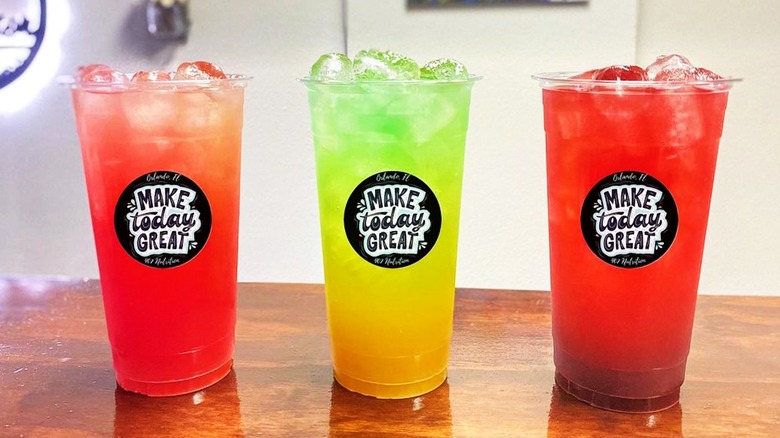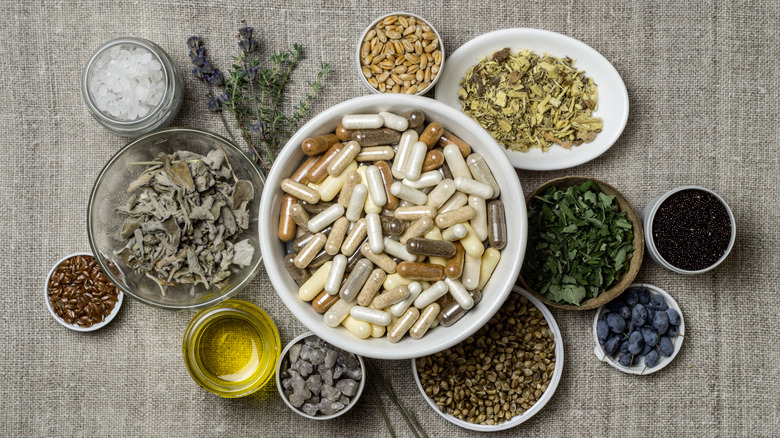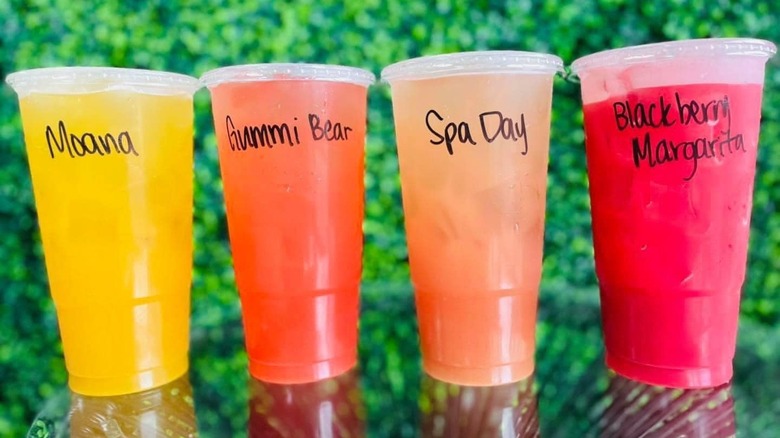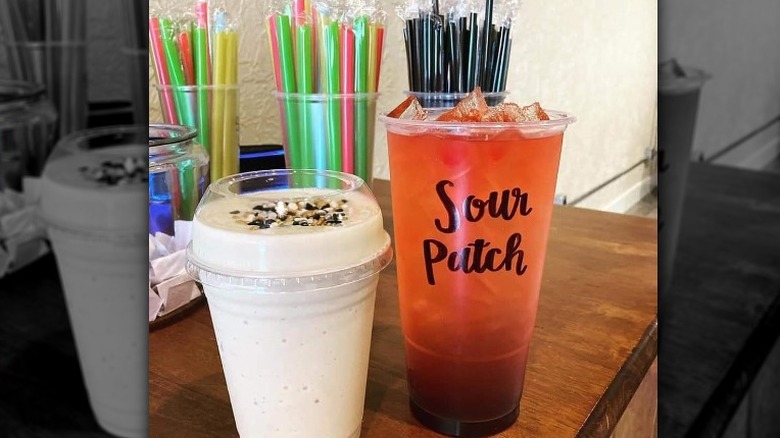The Hidden Truth Of Loaded Teas
Loaded teas are the new social media-worthy beverages boasting vivid colors and playful names like Gummi Bear or Unicorn, according to Today. The trendy drinks often sold at health stores, gyms, and juice bars are said to have many nutritional benefits like increasing energy and immunity or aiding in weight loss. The colorful drinks have piqued consumers' curiosity and quickly gained popularity, but are loaded teas everything they're brewed up to be?
Eater describes loaded teas as low-calorie drinks made from fruit-flavored mixes or herbal tea concentrate that often contain a cocktail of nutritional supplements and a boatload of caffeine. These drinks are often depicted as healthy beverages, posted on social media with hashtags like #cleanenergy, and marketed with claims about the drinks' supposed immunity-building capabilities and high antioxidant levels.
There is no standard recipe for loaded teas, and some contain artificial sweeteners, high fructose corn syrup, food coloring, and over 160 milligrams of caffeine. Sometimes they don't even contain tea. Naturopathic doctor and nutritionist Dr. Tanja Johnston told Today, "It's the same formula as an energy drink, but they call it a tea—because teas are what 'healthy people' drink." Fans of loaded teas enjoy the flavor and purported nutritional benefits that retailers of the beverages say they provide, but what else is behind this trend? That's a loaded question.
How Herbalife is involved in the loaded tea trend
According to Grocery Dive, consumers are more invested in health and wellness than ever before and have broadened a marketplace for businesses selling foods and beverages with clean ingredients and nutritional benefits. Shoppers looking to achieve diet and nutrition goals often trust the products sold at grocery stores, fitness clubs, and health-focused restaurants to aid them in their effort to lead healthier lives. As loaded teas gain in popularity, knowledgeable consumers are asking basic questions about their ingredients and the expertise level of the retailers selling them.
When Brittany Jezouit at Better Marketing asked a local cafe selling loaded teas if there were Herbalife products in its beverages, she didn't get a response, but she did get blocked from its Instagram page. Herbalife, for anyone who hasn't been hit up by multiple family members and long-lost friends from high school, is a global company selling vitamins, supplements, meal replacements, and other "wellness" products through a multilevel marketing (MLM) network. Eater describes how this company that formerly relied on word-of-mouth sales is quickly building a community of storefronts that is all about selling its supplements and signing up new distributors by tapping into the loaded tea trend.
Is it a nutrition club or Herbalife storefront?
Often characterized as health food stores, juice bars, or smoothie shops, nutrition clubs are actually storefronts used by a Herbalife salesperson to market their products and recruit new members, according to the Greeley Tribune. The company requires owners of these clubs to follow a long list of operating rules that have many wondering if these small businesses are legitimate businesses.
Herbalife requires distributors working out of a storefront or juice bar to refrain from calling themselves food establishments or retailers. The clubs cannot post prices but instead charge a membership fee for patrons. Nutrition clubs can't have an open/closed sign on the door, make the interior of the store visible from the outside, or market products through any standard channels except social media. They can't use any Herbalife branding either.
Despite not knowing if Herbalife or its distributors came up with the idea of selling loaded teas out of physical locations, Today states that nutrition clubs are popping up all over the U.S. with 5,900 active locations. Although they appear to be health stores, these clubs are run by folks who are not required to have any experience in fitness or nutrition, and they often avoid divulging the ingredients in their products.
Are loaded teas dangerous?
According to CNET, many people are big fans of loaded tea, but the way it affects you depends on your personal health status and sensitivity level to caffeine and supplements. People who don't handle stimulants like caffeine, guarana, and ginseng very well might experience jitters, rapid heart rate, elevated blood pressure, and more. Loaded teas might also contain toxic levels of vitamins, like B3, that can cause nausea, an increased heart rate, and skin flushing.
According to Today, experts note that consuming large amounts of vitamins, supplements, and stimulants in one beverage can send your cardiovascular system into overdrive, especially if you're a teen. Over time, consuming these ingredients on a daily basis can negatively affect your health. Loaded teas are probably safe for most healthy adults, as long as you know your individual health history and are aware of what you're consuming. Better yet, make your own loaded tea at home with ingredients you know.
Better Marketing describes how difficult it can be to get a straight answer about the Herbalife ingredients that may be in your loaded tea. When exploring new wellness trends, it's best to have a healthy dose of skepticism and know what you're drinking before you take a sip.



